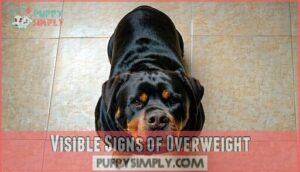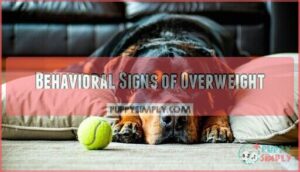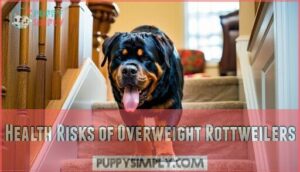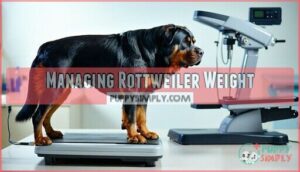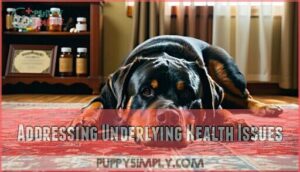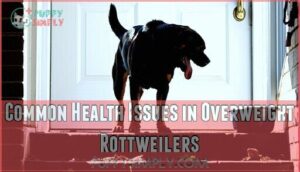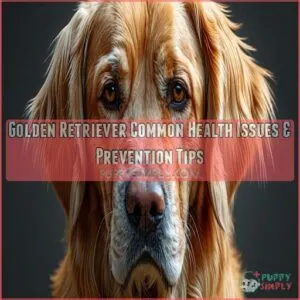This site is supported by our readers. We may earn a commission, at no cost to you, if you purchase through links.
 If your Rottweiler is overweight, you’ll notice signs like a lack of a visible waist, difficulty feeling their ribs, or struggling with everyday activities like climbing stairs.
If your Rottweiler is overweight, you’ll notice signs like a lack of a visible waist, difficulty feeling their ribs, or struggling with everyday activities like climbing stairs.
Their ideal weight varies, but male Rottweilers typically weigh 95–135 pounds, while females range from 80–100 pounds.
Extra pounds can put strain on their joints, increase the risk of heart disease, and even shorten their lifespan.
Overeating, too many treats, and limited exercise are common culprits, so start by reducing portions, swapping treats for healthier options, and adding more playtime to their routine.
Keep an eye on them—small changes yield big results over time, and it’s essential to monitor their progress to prevent overweight issues and ensure they lead a healthy life with regular exercise.
Table Of Contents
- Key Takeaways
- Ideal Weight for Rottweilers
- Signs of Overweight Rottweilers
- Rottweiler Growth Stages
- Factors Contributing to Overweight Rottweilers
- Managing Rottweiler Weight
- How to Help Overweight Rottweilers
- Veterinary Care for Overweight Rottweilers
- Common Health Issues in Overweight Rottweilers
- Maintaining a Healthy Rottweiler
- Frequently Asked Questions (FAQs)
- How to tell if a Rottweiler is overweight?
- Can a Rottweiler weigh 200 pounds?
- What is the weight limit for a Rottweiler?
- Why are Rottweilers prone to obesity?
- What is the recommended amount of exercise for a Rottweiler?
- Is there a specific diet plan for overweight Rottweilers?
- What are the long-term health effects of having an overweight Rottweiler?
- What can I do to prevent my Rottweiler from becoming overweight?
- Are there any treatments available for overweight Rottweilers?
- What are the best exercises for overweight Rottweilers?
- Conclusion
Key Takeaways
- Keep your Rottweiler fit by focusing on portion control, cutting high-calorie treats, and feeding a balanced, high-protein, low-carb diet.
- Daily exercise like walks, swimming, or fetch helps burn calories and boosts mobility while protecting joints.
- Watch for signs of being overweight, like no visible waist, trouble feeling ribs, or tiring easily during physical activity.
- Regular vet check-ups can detect obesity-related issues early and help create a personalized weight management plan.
Ideal Weight for Rottweilers
Your Rottweiler’s ideal weight ranges from 80-100 pounds for females and 95-135 pounds for males, with variations based on height and body structure.
Maintain your Rottweiler’s ideal weight with balanced nutrition and exercise to ensure a healthy, happy, and active life.
You’ll need to maintain this healthy weight range through proper nutrition and regular exercise to prevent obesity-related health issues like joint problems and heart conditions.
Male Rottweiler Weight Range
Male Rottweilers typically maintain a healthy weight between 95-135 pounds when fully grown.
According to breed standards, their ideal weight corresponds to their height, with most males standing 24-27 inches tall.
Genetics influence their final size, but your Rottweiler’s growth timeline should reach completion by age 2-3 years.
Regular monitoring guarantees your dog stays within this weight range, preventing potential health complications associated with excess weight, which is crucial for maintaining a healthy weight.
Female Rottweiler Weight Range
While males tend to be larger, female Rottweilers have their own healthy weight standards. Your female Rottie should weigh between 80-100 pounds when fully grown, reaching this range by age 2-3.
During growth stages, expect these weight milestones:
- 35-45 pounds at 3 months
- 60-70 pounds at 6 months
- 75-85 pounds at 9 months
- 85-100 pounds by 1 year
Regular weight monitoring helps prevent health issues down the road.
Factors Affecting Rottweiler Weight
Several factors influence your Rottweiler’s weight beyond simple food intake.
Genetics play a primary role, while age influence becomes evident as metabolism slows in senior dogs.
Neutering impact can reduce metabolic rate by 20-30%, increasing weight gain risk.
Activity levels, muscle mass, and hydration levels all affect body composition.
Medical conditions like hypothyroidism or medication side effects may also contribute to unexpected weight changes.
Regular monitoring helps maintain your Rottweiler’s ideal weight, considering factors like metabolic rate and overall body composition.
Signs of Overweight Rottweilers
You’ll notice significant changes in your Rottweiler’s physical appearance and behavior when they exceed their ideal weight range.
Significant physical changes and reduced energy are clear signs your Rottweiler may be carrying extra weight that requires immediate attention.
A lack of visible waist definition, difficulty feeling ribs beneath the coat, and decreased energy during walks are clear indicators that your canine companion may be carrying excess weight that requires attention.
Visible Signs of Overweight
Recognizing when your Rottweiler is carrying extra pounds requires visual assessment of their body condition.
When you look at your dog from above, you should see a clear waist definition between ribs and hips.
Here are 4 visible signs of an overweight Rottweiler:
- No visible waist when viewed from above
- Difficult rib palpation (ribs not easily felt)
- Stomach width exceeds chest width
- Abdominal sagging with no waistline
The key to identifying these signs is to understand what a healthy Rottweiler looks like and to monitor any changes in their body condition regularly.
Behavioral Signs of Overweight
Beyond physical appearance, your Rottweiler’s behavior can signal weight issues.
Watch for reduced playfulness—an overweight Rottie that once loved fetch may now refuse after just a few throws.
You’ll notice increased irritability, more frequent napping, and reluctance to interact with other dogs.
Training becomes difficult as they tire quickly.
These changes in social interaction, sleep patterns, and overall enthusiasm are key rottweiler obesity signs you shouldn’t ignore.
Health Risks of Overweight Rottweilers
Your Rottweiler’s excess weight isn’t just a cosmetic concern—it’s a serious health threat.
Obesity can reduce their lifespan by up to two years and increases risks of diabetes, cancer, and heart disease.
Just 10% excess weight can decrease lifespan by one-third while worsening joint stress and organ strain.
Overweight Rottweilers commonly develop arthritis, kidney disease, and high blood pressure, making weight management essential for their longevity.
Regular exercise helps maintain a healthy weight and overall well-being.
Rottweiler Growth Stages
You’ll need to understand your Rottweiler’s growth trajectory to properly monitor their weight through each developmental stage.
From rapid puppy growth to adult maturation, knowing the normal weight ranges will help you prevent obesity and maintain ideal health for your dog.
Puppy Growth Rate
Now that you know what to watch for in an overweight Rottweiler, understanding proper growth rates helps set healthy expectations.
Your Rottweiler puppy develops at an impressive pace during the first months of life.
- Newborn puppies double their birth weight within just one week
- Puppies grow approximately 5-10% daily from weeks 1-8
- Monthly weight tracking helps monitor healthy development
- Males typically grow more rapidly than females
- Growth rate naturally slows after 8 weeks of age, which is a critical period for monitoring, as it helps in identifying any healthy development issues early on.
Adolescent Growth Stage
The adolescent stage marks dramatic growth spurts in your Rottweiler’s development, typically occurring between 6-18 months.
During this period, their dietary needs change substantially.
| Age (months) | Weight (lbs) | Required Action |
|---|---|---|
| 6-8 | Males: 64-78 |
Females: 59-67 calorie intake
Females: 70-85
Females: 75-95
Females: 80-100 adult food
Adult Growth Stage
Your Rottweiler has now entered the adult growth stage. While they’ve reached their full height by around 1 year, their weight and muscle mass development continue until age 2-3.
During this time:
- Their metabolic rate shifts, making them more prone to adult weight gain
- Bone density changes occur, completing skeletal maturity
- They’ll achieve their rottweiler ideal weight of 80-135 pounds depending on gender
Monitor closely to maintain proper rottweiler weight management.
Factors Contributing to Overweight Rottweilers
Your Rottweiler’s weight issues stem from multiple factors including excessive caloric intake, insufficient exercise, genetic predisposition, and underlying medical conditions.
Understanding these contributing elements will help you develop an effective weight management plan that addresses your dog’s specific needs, including considering genetic predisposition.
Overindulgence in Food
Many Rottweilers struggle with weight gain due to overindulgence in food.
Your dog’s kibble overfeeding can quickly add up, especially when you’re not measuring portions properly. Excessive treats and table scraps compound this problem, adding unnecessary calories to their daily intake.
To prevent an overweight Rottweiler, implement strict portion control and monitor their calorie intake according to a rottweiler feeding guide suited to their specific needs.
Lack of Exercise
While feeding too much is one issue, your Rottweiler’s exercise routine is equally important.
Lack of sufficient physical activity leads directly to weight gain in these naturally athletic dogs.
Regular exercise prevents:
- Reduced mobility and joint problems
- Decreased energy expenditure
- Declining activity levels
- Increased risk of obesity-related diseases
A sedentary lifestyle substantially impacts your Rottweiler’s health, as these dogs have substantial exercise needs that, when unmet, contribute to excess weight and associated health risks.
Genetics and Environment
While exercise habits matter, your Rottweiler’s genetic predisposition plays a significant role in weight management.
Rottweilers naturally tend toward obesity due to their gluttonous nature and sometimes under-motivation to exercise.
Environmental factors like diet quality and feeding schedule can exacerbate these tendencies.
Your home setup and lifestyle choices directly impact your dog’s weight gain potential, and even with identical diets, breed variations mean Rottweilers may gain weight differently than other breeds due to their unique epigenetic factors.
Joint and Mobility Issues
Rottweiler joint problems like dysplasia, ligament ruptures, and OCD can worsen with weight gain, impacting mobility.
Overweight Rottweiler risks include pain and reduced movement.
Manage joint health with these tips:
- Focus on Dysplasia Management by maintaining a healthy weight.
- Prevent ligament injuries with low-impact activity.
- Use supplements for joint health.
- Provide Mobility Solutions like supportive bedding or ramps.
Heart and Digestive Health Risks
An overweight Rottweiler faces serious risks like Subaortic Stenosis (aortic narrowing) and Gastric Dilatation-Volvulus (bloat).
Dog obesity strains essential organs, affecting rottweiler heart health and digestion.
Smaller meals, spaced wisely, alongside careful exercise timing, reduce these weight-related diseases.
Early diagnosis of conditions is key, emphasizing the need for a proper rottweiler diet plan and regular vet visits to safeguard their well-being.
Cancer Risks in Rottweilers
Cancer dramatically impacts Rottweilers’ lives, with their size and genetics increasing risks.
Lymphoma, mast cell tumors, and osteosarcoma are common. Early detection matters because osteosarcoma can spread fast, and hemangiosarcoma signs often appear too late.
Watch for unusual lumps, limping, or fatigue. Rottweilers are at higher risk of osteosarcoma, a common bone tumor in the breed.
Neglected weight issues worsen these risks, so staying proactive in managing your dog’s health can truly save lives.
Managing Rottweiler Weight
You can help your Rottweiler maintain a healthy weight by focusing on proper diet, consistent exercise, and regular weight monitoring.
These steps support your dog’s overall health and reduce the risk of weight-related issues, which is crucial for your dog’s overall health.
Diet and Nutrition
Food choices and portions make or break your dog’s health. Prioritize healthy protein, moderate fats, and low carbs.
Adult Rottweilers need 1,600–2,300 calories daily. Here’s a quick comparison:
| Food Type | Pros | Cons |
|---|---|---|
| Wet Food | Hydration, fewer carbs | Costly, shorter shelf life |
| Kibble | Affordable, convenient | Less hydration, carb-heavy |
| Balanced Diet | Meets calorie intake needs | Needs careful planning |
Consider specialized options like Rottweiler weight food for customized nutrition. Reduce treats, control portions, and consult your vet regularly to ensure your dog maintains a healthy lifestyle with the right calorie intake.
Exercise and Physical Activity
Balancing exercise intensity with your Rottweiler’s needs keeps their weight in check.
Tailor activity modifications to fit their life stage:
- Puppies: Short play sessions prevent overexertion.
- Adults: Long daily walks or fetch sessions support rottweiler healthy weight goals.
- Seniors: Gentle strolls or swimming protect joints while aiding rottweiler weight loss.
Active routines guarantee a happy, fit canine companion.
Monitoring Weight and Body Condition
Tracking your Rottweiler’s healthy weight means combining regular weighing, visual assessments, and palpation techniques. Use a body scoring chart for better dog weight monitoring and recognize weight benchmarks.
Feel for the ribs without applying too much pressure—they should be easy to locate. Regular checks catch changes early, preventing long-term issues. Ensuring optimal canine health is vital for your Rottweiler’s well-being.
| Checkup Type | Frequency | What to Look For | Tools Needed |
|---|---|---|---|
| Weighing | Monthly | Weight benchmarks | Scale |
| Visual Assessment | Weekly | Waist definition | None |
| Palpation | Weekly | Ribs, body condition | Hands |
| Vet Visit | Annually | Overall health, weight | Veterinary Expertise |
How to Help Overweight Rottweilers
Helping your overweight Rottweiler requires small, consistent changes to their diet and activity levels.
By reducing portion sizes, limiting treats, and encouraging more exercise, you can improve their overall health and quality of life, which involves making small and consistent changes.
Reducing Treats and Portion Sizes
Cutting back on treats and controlling portions is key to managing your Rottweiler’s calorie intake. Here’s how:
- Swap treats for low-calorie alternatives.
- Use a measuring cup for precise portions.
- Stick to consistent feeding schedules.
- Gradually reduce daily food amounts.
- Monitor your dog’s nutrition by reading dog food labels.
Small adjustments to their diet can lead to big health improvements.
Managing your dog’s diet effectively requires attention to detail and a consistent approach.
Increasing Physical Activity
After adjusting portions, focus on movement. Start slow with joint-friendly activities like short walks or swimming, perfect for overweight Rottweilers.
Using a buoyant vest option can make swimming easier. Gradual increases in exercise frequency prevent overexertion.
Stick to a consistent dog exercise routine, and incorporate fun activity ideas like fetch to boost activity motivation. Meeting their exercise needs daily promotes Rottweiler weight management while improving energy and mood.
Addressing Underlying Health Issues
If your Rottweiler’s weight feels like carrying a loaded backpack, underlying health issues might be involved.
Conditions like joint inflammation, hormonal imbalances, or metabolic disorders can worsen obesity.
Work with a vet to tackle these:
- Address pain management for mobility.
- Check for medication side-effects affecting weight.
- Rule out weight-related diseases impacting Rottweiler health issues.
Healthy dogs are happier companions!
Veterinary Care for Overweight Rottweilers
Regular vet check-ups are essential to monitor your Rottweiler’s weight and overall health.
A veterinarian can create a personalized weight management plan to address your dog’s specific needs and prevent serious health risks.
Importance of Regular Check-ups
Early detection through regular vet checkups can make a world of difference for an overweight Rottweiler.
Preventative care lets your vet catch issues like obesity-related joint pain or heart problems before they worsen.
It’s also a chance to monitor your dog’s weight and overall health, ensuring small changes don’t lead to bigger problems.
Open vet communication helps create a customized care plan, saving costs in the long run by avoiding expensive treatments.
Think of it like tuning a car—a little maintenance now keeps your Rottweiler running smoothly and feeling their best later, which is the key to long-term health.
Weight Management Plans
If your Rottweiler looks overweight, a weight management plan is essential.
Start with a vet consultation to assess their current health and set realistic goals. Gradual changes work best—don’t rush it!
Focus on calorie counting and portion control to meet their dietary needs. Pair this with a consistent exercise regimen to burn energy safely.
Dog nutrition matters too: switch to high-protein, low-carb food for better results. Ideal caloric intake depends on several factors.
Make adjustments slowly to avoid stress on your dog. Remember, you’re their partner in this journey, so consistency and patience are key to long-term success.
Common Health Issues in Overweight Rottweilers
Carrying extra weight puts your Rottweiler at risk for serious health problems like hip dysplasia, heart disease, and digestive issues.
Recognizing these conditions early can help you take steps to improve your dog’s health and quality of life, which is crucial for preventing further complications from serious health problems.
Hip and Elbow Dysplasia
Rottweilers, especially overweight ones, are prone to hip and elbow dysplasia due to their genetic predisposition.
These joint problems cause pain and mobility issues, making daily movements tough.
Joint supplements and exercise modification can ease discomfort, while surgical options may be necessary for severe cases.
Pain management is essential to improve quality of life and keep your dog moving comfortably.
Heart Conditions
Carrying extra weight puts strain on your Rottweiler’s heart, increasing the risk of aortic stenosis (SAS) and other heart problems.
Protect your dog’s health by addressing weight-related issues:
- Regular check-ups for SAS diagnosis
- Balanced diet to reduce strain on the heart
- Frequent, moderate exercise for heart strength
- Limiting bloat risks through smaller meals
- Understanding genetic factors affecting heart health
Preventive care includes regular vet check-ups for ideal health, which helps in early diagnosis and treatment of potential issues, ensuring your dog leads a healthy life with a strong heart health and minimizing the risk of genetic factors.
Digestive Issues
An overweight dog’s sensitive stomach can lead to bloating and digestive upset.
Bloat prevention is vital—it’s life-threatening for Rottweilers.
Feed multiple small meals, not one large one, and add dietary fiber, probiotics, and enzyme supplements to improve digestion.
Stick to high-quality dog food designed for digestion and regular vet care guarantees your Rottweiler’s diet supports dog health and reduces risks tied to being overweight.
Maintaining a Healthy Rottweiler
Keeping your Rottweiler healthy means focusing on regular exercise, balanced nutrition, and consistent veterinary care. These habits both help manage their weight and reduce the risk of common health issues.
Regular Exercise and Physical Activity
An active Rottweiler is a healthy one! Tailor exercise routines to their age and limits.
Puppies need short, playful bursts to match their energy, while seniors benefit from gentle walks supporting joint health.
Balance exercise frequency with breaks to avoid strain. Finding the right equipment can also help with their fitness; consider exploring Rottweiler exercise solutions to find what suits your dog best.
Activity ideas like fetch, swimming, or agility training keep them fit and engaged, ensuring ideal dog health and managing overweight risks.
Balanced Diet and Nutrition
A balanced Rottweiler diet is key to preventing weight gain.
Focus on calorie requirements and healthy proteins like chicken or lamb. Puppies need controlled nutrition; wet food often trumps kibble for hydration.
Practice portion control and reduce treats to manage rottweiler calorie intake.
Tailor meals to activity levels and consult a vet for adjustments to prevent unwanted weight.
Regular Veterinary Care
Routine veterinary care keeps your Rottweiler healthy and fit.
Regular checkups help prevent weight-related diseases and guarantee your dog thrives.
Here’s what to prioritize:
- Annual checkups for early disease detection.
- Vaccinations to prevent harmful infections.
- Dental care for overall health.
- Parasite control to avoid hidden issues.
- Emergency care readiness for unexpected situations.
Trust your vet’s advice—they’re your dog’s best ally to ensure healthy living conditions!
Frequently Asked Questions (FAQs)
How to tell if a Rottweiler is overweight?
A Rottweiler might be overweight if you can’t easily feel its ribs, it has a wide waist, struggles with stairs, gets tired on walks, or has a sagging belly.
Regularly monitor weight and activity.
Can a Rottweiler weigh 200 pounds?
It’s uncommon, but a Rottweiler could weigh 200 pounds if severely obese or a mixed breed.
Healthy males peak around 135 pounds.
If you suspect extreme weight, consult a vet to guarantee proper care.
What is the weight limit for a Rottweiler?
Think of a Rottweiler like a linebacker—they’re big but not limitless.
Male Rottweilers typically max out at 135 pounds, while females peak around 100 pounds.
Anything heavier and you’re likely looking at health concerns.
Why are Rottweilers prone to obesity?
You’ve got to watch their diet and activity because these dogs love food and lounging.
Overeating, limited exercise, and genetics make them prone to pack on pounds.
Healthy food and regular play keep them fit.
What is the recommended amount of exercise for a Rottweiler?
Aim for 60–90 minutes of daily exercise.
Mix walks, playtime, and mental challenges like training or puzzles.
Avoid overdoing it; balance activity with your dog’s energy level, age, and any health concerns, considering complete concepts like these to ensure a balanced approach.
Is there a specific diet plan for overweight Rottweilers?
Picture your Rottweiler moving like a sumo wrestler stuck on roller skates.
Switch to high-protein, low-carb meals, include leafy greens, reduce table scraps, cut treats, and work with your vet on portion-controlled feeding for progress.
What are the long-term health effects of having an overweight Rottweiler?
An overweight Rottweiler faces joint problems, heart strain, reduced mobility, and increased cancer risks.
Extra weight stresses their frame, cutting lifespan.
Regular exercise, portion control, and vet checkups keep them healthy, strong, and happier long-term.
What can I do to prevent my Rottweiler from becoming overweight?
Feed appropriate portions, stick to a balanced diet, and limit treats.
Make certain daily exercise, like walks or playtime, to keep them active.
Regularly check their weight and consult your vet for personalized guidance.
Are there any treatments available for overweight Rottweilers?
You can manage your Rottweiler’s weight by reducing portion sizes, cutting high-calorie treats, and encouraging daily exercise like walking or playtime.
Consult a vet to create a customized diet and exercise plan.
What are the best exercises for overweight Rottweilers?
Think of it as a gentle nudge toward fitness—daily walks, light swimming, and playful fetch are ideal.
Focus on low-impact activities to protect joints, gradually increasing intensity.
Consistency matters more than duration, so stay patient!
Conclusion
Think of your Rottweiler’s health as a sturdy fortress—it relies on a strong foundation built with a proper diet, regular exercise, and veterinary care.
Addressing an overweight Rottweiler isn’t just about shedding pounds; it’s about giving them a longer, happier life.
By recognizing the signs, adjusting their routine, and monitoring progress, you’ll help them thrive.
Start small, stay consistent, and remember that every healthy choice strengthens their well-being, a fit Rottweiler means fewer risks and more joyful moments together.
- http://www.coventrytelegraph.net/news/coventry-news/coventry-hit-obese-pets-epidemic-304778
- http://drsophiayin.com/blog/entry/is-your-dog-fit-or-fat-learn-how-to-body-condition-score-him
- https://imprimedicine.com/get-started
- https://www.canva.com/photos/MAEGw8zD3o0-attentive-rottweiler-on-bright-grass-meadow-in-park/
- https://images.akc.org/pdf/breeds/standards/Rottweiler.pdf


